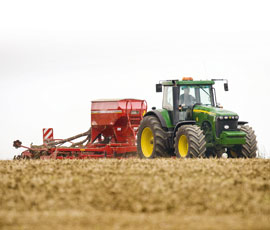‘Dry November’ raises hopes for drilling campaign

Farmers who fear they may have to abandon drilling crops this autumn were given hope today (1 November) after dry weather was forecast for much of November.
Some growers have given up on drilling crops this autumn, following months of persistent wet weather, which has left fields sodden and too wet to travel on.
The Met Office said on today that the unsettled conditions were likely to continue across the UK for the next 10 days.
But from mid-November, forecasters are predicting that conditions will turn cooler and drier, with below-average temperatures, for at least a fortnight.
“The weather will continue to be relatively unsettled for the next 10 days,” said Met Office forecaster Charlie Powell.
“But from mid-November onwards there are signs it could become less unsettled, which is positive news for farmers trying to get crops in the ground. The end of November will be cooler, but dry, with an increased risk of overnight frosts.”
Hertfordshire organic grower Howard Roberts welcomed news of dry weather as, like many growers, he was still waiting for a window to start drilling winter cereals.
“We have got all our autumn drilling to do – about 40ha,” said Mr Roberts, from Hammonds End Farm, Harpenden.
“It started to dry out a bit, but then we had rainfall overnight Wednesday – 13mm – which is not helping.
“I’m not panicking yet, but I have started to cover myself for enough spring seed. I might have to plant more than I had originally wanted.”
In west Lancashire, farmer Barry Hurst of Bullens Farm in Bickerstaffe said the wet conditions were delaying the potato harvest.
“We have been pottering about harvesting the odd acre here and there. But some people haven’t harvested any spuds yet,” he said.
“Yields on potatoes are about half of what they should be on average. The prices are very strong but it’s no good having a good price if you haven’t got anything to sell.”
Mr Hurst said he no winter cereals had been sown on the farm owing to the persistent wet weather. Instead, this season he is concentrating on preparing the ground to sow spring barley for seed production.
“It’s been a testing season. It has just rained and rained and even when you do get the odd dry day, it never dries out enough to give you time to get on,” he said.
“We have sown winter wheat before in November, but I think the ground is too sodden now.”
Farmers who have managed to drill winter wheat this autumn, but missed the pre-emergence stage, should be considering post-emergence sprays to knock out problem grassweeds, such as blackgrass, according to Dow Agrosciences’ cereal herbicide specialist Stuart Jackson.
“Agronomists say they are concerned that crops may be stressed due to poor seed-beds and saturated soils, and I would agree that caution should be taken,” said Mr Jackson.
“In these circumstances agronomists are considering an application of half-dose flufenacet products [120g/ha], with the balance delivered as a separate application shortly after. This second application of flufenacet is vital to deliver the minimum 240g/ha and ideally this should be applied within 10 days.”
Read the latest autumn drilling progress on our CropWatch blog
Submit your autumn drilling progress on our interactive chart
Send us your photos of your cultivation work for our Cultivations on Camera 2012 gallery
Philip Case on G+
